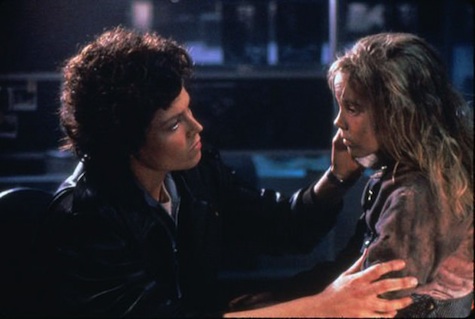On one hand, the republic would not have fallen if there had never been a sequel to Alien. Entire books could be written about how great—bordering very closely on perfect—Alien was as both science fiction and horror, not to mention how brilliant it was as cinema. Its unanswered questions are actually assets, deepening the mystery and thus the horror. But, on the other hand, those unanswered questions provided the basis for Aliens, a massively entertaining and actually quite moving piece of work.
What makes Aliens not only a sequel but a companion piece to Alien is the way it does for the action genre what its predecessor did for horror. Each picture is a master class in its respective genre, from narrative to design to acting, with every element integrated perfectly and contributing to making Alien a near-perfect SF horror movie, and Aliens a near-perfect SF action movie.
The story picks up (almost) where it left off, with Ripley (Sigourney Weaver) and Jones the cat adrift in hypersleep, intercepted by another spaceship. It turns out it’s now 57 years later, and not only are all her Nostromo shipmates dead (minor Alien spoiler) but so is just about anyone she ever met before that ill-fated voyage. Even worse, she finds out that the planet where the Nostromo found the alien is being terraformed by Weyland-Yutani.
Inevitably—if you saw the first movie—Weyland-Yutani lose contact with the terraforming colony, and Ripley is asked to accompany, in an advisory capacity, an elite Marine unit to go get to the bottom of things. They find one survivor. Well, one human survivor…
The differences between horror and action as a genre come into play here, as there are this time, not one, but many malevolent xenomorphs menacing our protagonists (all the more reason for the title not being Alien 2 but Aliens) as well as a sequence of escalating obstacles to overcome. Not to mention in an action movie, the likelihood of multiple protagonists surviving is increased, as action frequently requires a team working together.

That brings us to the cast, which is Aliens‘ greatest strength. Ripley, simultaneously hardened by her experiences in the first movie and possessed by a ferocious maternal connection to the lone surviver, grade-school-age girl Newt, becomes an all-time classic character. And she’s not the only one: Marines Hicks, Vazquez, and Hudson are all action movie Hall of Famers (easily the best performances of Jenette Goldstein’s and Bill Paxton’s careers, and is only denied the top spot in Michael Biehn’s due to his having been Kyle Reese and Johnny Ringo). Bishop is one of cinema’s great androids, well-played by the great Lance Henriksen. And the malignant Weyland-Yutani yuppie Burke is both a terrifically oily villain and by several orders of magnitude the best thing Paul Reiser has ever done.
Aliens spends over half its running time with its characters before the action starts, which is not to be confused with it starting slowly. If anything, that time adds to the tension (since we all know at some point people are going to start getting their asses handed to them by H.R. Giger aliens) and invests the audience far more deeply in the people handed their ass. That Aliens‘ structure is a steady build makes the feverish intensity of the climax all the more effective: contrast it with so many modern blockbusters, that start out with the volume turned all the way up and leave it there for the whole movie, leading to sensory overload. Aliens manages to reach greater heights and have more impact precisely because it takes its time on the build. By the time Ripley straps into the cargo loader it’s all you can do not to stand up and cheer, out of the sheer exhilarating intensity of the movie as a whole.
Easily one of the best sequels extant, Aliens is arguably the first movie of writer-director James Cameron’s to really feel like his; this is to take nothing away from The Terminator, it’s just that its leanness and the small size of its budget has little to do with the bigger-is-better, more more more James Cameron that would follow. Aliens features the goofy gung-ho banter and overgrown adolescents (neither of which, to be clear, is necessarily a bad thing, certainly not in most James Cameron movies) that would later populate The Abyss, Terminator 2, True Lies, and even Titanic to a degree. Aliens benefits from a freshness the others lack in that regard, as this was Cameron’s first trip to that particular well. It was also an early demonstration, much like The Terminator, that James Cameron knew how to build an action movie that worked. Because he does. Oh does he ever.
Danny Bowes is a New York City-based film critic and blogger.










